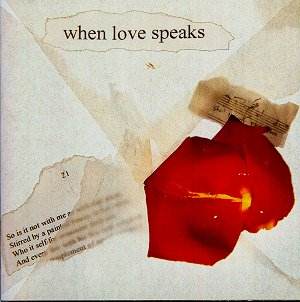The executive producer of this enterprising compilation
is film music composer, Michael Kamen. The selection of some of Shakespeare’s
best-loved sonnets (and other writings) are read by a glittering array
of some of the world’s leading actors. All, except Joseph Fiennes, have
passed through RADA (the Royal Academy of Dramatic Art), and they have
all donated their talents in its cause.
All the readings are fine, some outstanding in the
power and sensitivity of their delivery, like: John Gielgud reading
Sonnet 23, "As an unperfect actor on the stage…" ; Alan Rickman’s
ironic "My mistress’ eyes are nothing like the sun…" (Sonnet
130), and John Hurt’s sardonic interpretation of Sonnet 147 "My
love is as a fever, longing still … for I have sworn thee fair and thought
thee bright, who art as black as hell and dark as night." Then
there is Alan Bates' dark intoning of Sonnet 66, "Tired with all
these for restful death I cry"; and Kenneth Branagh’s quiet yet
moving delivery of Sonnet 30, "When to the sessions of sweet silent
thought I summon up remembrance of things past…"
Frequently, there are a few bars of gentle lute music
between the readings. There are also eight musical settings, most of
these modern or pop in style like Annie Lennox singing an upbeat pop
rendering of Christopher Marlowe’s "Live with me and be my love…".
Sonnet 29, "When in disgrace with fortune and men’s eyes"
is sung by Rufus Wainwright with an interesting "Tudor" strumming
accompaniment. Keb Mo has a modern electronic take on "No more
be grieved at which thou hast done…". John Dowland’s "Come
again: sweet love doth now invite", is sung much more in the Tudor
fashion by John Potter; a lovely setting with an outstanding accompaniment.
There is a suitably mournful slightly atonal mock-Tudor setting, by
Michael Kamen, of ‘The Willow Song’ from Othello sung by Barbara
Bonney. Ladysmith Black Mazambo bring a spiritual approach to "Music
to hear, why hear’st thou music sadly." Brian Ferry’s "Shall
I compare thee to a summer’s day?" has an appealing if shaky sincerity.
Least successful is the less than expressive singing of Des’ree in "The
quality of mercy is not strained" from The Merchant of Venice.
Ian Lace


